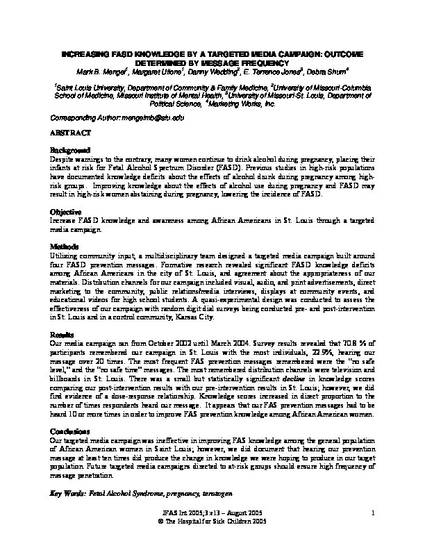
Article
Increasing Fetal Alcohol Syndrome Knowledge by a Targeted Media Campaign
Journal of Fetal Alcohol Syndrome International
(2005)
Abstract
Background Despite warnings to the contrary, many women continue to drink alcohol during pregnancy, placing their infants at risk for Fetal Alcohol Spectrum Disorder (FASD). Previous studies in high-risk populations have documented knowledge deficits about the effects of alcohol drunk during pregnancy among highrisk groups. Improving knowledge about the effects of alcohol use during pregnancy and FASD may result in high-risk women abstaining during pregnancy, lowering the incidence of FASD. Objective Increase FASD knowledge and awareness among African Americans in St. Louis through a targeted media campaign. Methods Utilizing community input, a multidisciplinary team designed a targeted media campaign built around four FASD prevention messages. Formative research revealed significant FASD knowledge deficits among African Americans in the city of St. Louis, and agreement about the appropriateness of our materials. Distribution channels for our campaign included visual, audio, and print advertisements, direct marketing to the community, public relations/media interviews, displays at community events, and educational videos for high school students. A quasi-experimental design was conducted to assess the effectiveness of our campaign with random digit dial surveys being conducted pre- and post-intervention in St. Louis and in a control community, Kansas City. Results Our media campaign ran from October 2002 until March 2004. Survey results revealed that 70.8 % of participants remembered our campaign in St. Louis with the most individuals, 22.9%, hearing our message over 20 times. The most frequent FAS prevention messages remembered were the “no safe level,” and the “no safe time” messages. The most remembered distribution channels were television and billboards in St. Louis. There was a small but statistically significant decline in knowledge scores comparing our post-intervention results with our pre-intervention results in St. Louis; however, we did find evidence of a dose-response relationship. Knowledge scores increased in direct proportion to the number of times respondents heard our message. It appears that our FAS prevention messages had to be heard 10 or more times in order to improve FAS prevention knowledge among African American women. Conclusions Our targeted media campaign was ineffective in improving FAS knowledge among the general population of African American women in Saint Louis; however, we did document that hearing our prevention message at least ten times did produce the change in knowledge we were hoping to produce in our target population. Future targeted media campaigns directed to at-risk groups should ensure high frequency of message penetration.
Keywords
- Fetal Alcohol Syndrome,
- pregnancy,
- teratogen
Disciplines
Publication Date
November, 2005
Citation Information
E. Terrence Jones, Mark Mengel, Debra Shurn and Danny Wedding. "Increasing Fetal Alcohol Syndrome Knowledge by a Targeted Media Campaign" Journal of Fetal Alcohol Syndrome International (2005) Available at: http://works.bepress.com/eterrence-jones/32/
